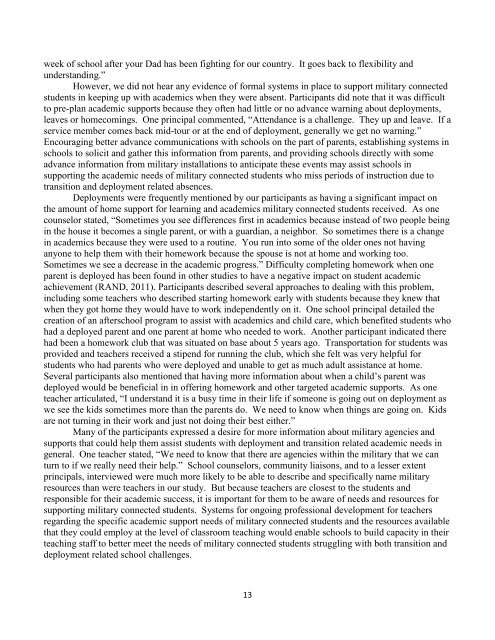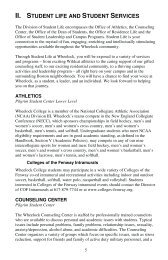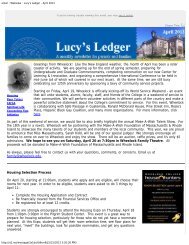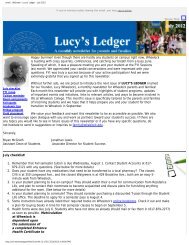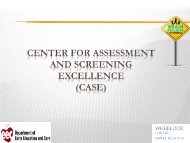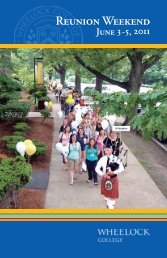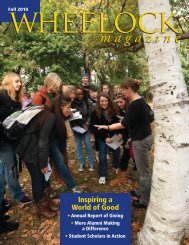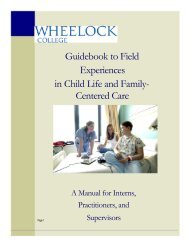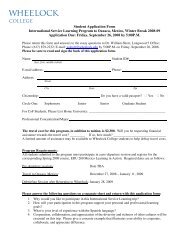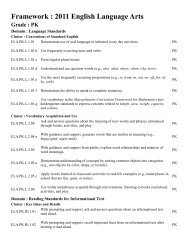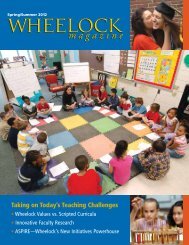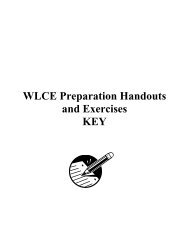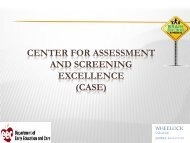Download the study (pdf)
Download the study (pdf)
Download the study (pdf)
Create successful ePaper yourself
Turn your PDF publications into a flip-book with our unique Google optimized e-Paper software.
week of school after your Dad has been fighting for our country. It goes back to flexibility andunderstanding.”However, we did not hear any evidence of formal systems in place to support military connectedstudents in keeping up with academics when <strong>the</strong>y were absent. Participants did note that it was difficultto pre-plan academic supports because <strong>the</strong>y often had little or no advance warning about deployments,leaves or homecomings. One principal commented, “Attendance is a challenge. They up and leave. If aservice member comes back mid-tour or at <strong>the</strong> end of deployment, generally we get no warning.”Encouraging better advance communications with schools on <strong>the</strong> part of parents, establishing systems inschools to solicit and ga<strong>the</strong>r this information from parents, and providing schools directly with someadvance information from military installations to anticipate <strong>the</strong>se events may assist schools insupporting <strong>the</strong> academic needs of military connected students who miss periods of instruction due totransition and deployment related absences.Deployments were frequently mentioned by our participants as having a significant impact on<strong>the</strong> amount of home support for learning and academics military connected students received. As onecounselor stated, “Sometimes you see differences first in academics because instead of two people beingin <strong>the</strong> house it becomes a single parent, or with a guardian, a neighbor. So sometimes <strong>the</strong>re is a changein academics because <strong>the</strong>y were used to a routine. You run into some of <strong>the</strong> older ones not havinganyone to help <strong>the</strong>m with <strong>the</strong>ir homework because <strong>the</strong> spouse is not at home and working too.Sometimes we see a decrease in <strong>the</strong> academic progress.” Difficulty completing homework when oneparent is deployed has been found in o<strong>the</strong>r studies to have a negative impact on student academicachievement (RAND, 2011). Participants described several approaches to dealing with this problem,including some teachers who described starting homework early with students because <strong>the</strong>y knew thatwhen <strong>the</strong>y got home <strong>the</strong>y would have to work independently on it. One school principal detailed <strong>the</strong>creation of an afterschool program to assist with academics and child care, which benefited students whohad a deployed parent and one parent at home who needed to work. Ano<strong>the</strong>r participant indicated <strong>the</strong>rehad been a homework club that was situated on base about 5 years ago. Transportation for students wasprovided and teachers received a stipend for running <strong>the</strong> club, which she felt was very helpful forstudents who had parents who were deployed and unable to get as much adult assistance at home.Several participants also mentioned that having more information about when a child’s parent wasdeployed would be beneficial in in offering homework and o<strong>the</strong>r targeted academic supports. As oneteacher articulated, “I understand it is a busy time in <strong>the</strong>ir life if someone is going out on deployment aswe see <strong>the</strong> kids sometimes more than <strong>the</strong> parents do. We need to know when things are going on. Kidsare not turning in <strong>the</strong>ir work and just not doing <strong>the</strong>ir best ei<strong>the</strong>r.”Many of <strong>the</strong> participants expressed a desire for more information about military agencies andsupports that could help <strong>the</strong>m assist students with deployment and transition related academic needs ingeneral. One teacher stated, “We need to know that <strong>the</strong>re are agencies within <strong>the</strong> military that we canturn to if we really need <strong>the</strong>ir help.” School counselors, community liaisons, and to a lesser extentprincipals, interviewed were much more likely to be able to describe and specifically name militaryresources than were teachers in our <strong>study</strong>. But because teachers are closest to <strong>the</strong> students andresponsible for <strong>the</strong>ir academic success, it is important for <strong>the</strong>m to be aware of needs and resources forsupporting military connected students. Systems for ongoing professional development for teachersregarding <strong>the</strong> specific academic support needs of military connected students and <strong>the</strong> resources availablethat <strong>the</strong>y could employ at <strong>the</strong> level of classroom teaching would enable schools to build capacity in <strong>the</strong>irteaching staff to better meet <strong>the</strong> needs of military connected students struggling with both transition anddeployment related school challenges.13


